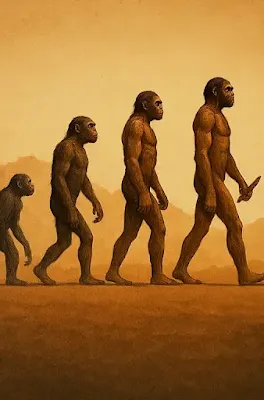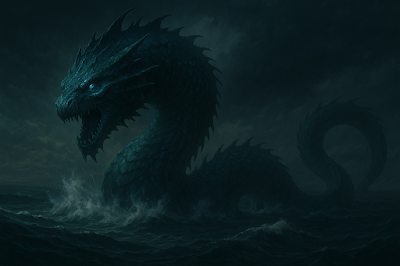From Apes to Apocalypse: The Unfinished Evolution of Humankind
> "We are not the end. We are the beginning of something else." — An Unknown Future Archaeologist
#Introduction: Where Did We Come From, and Where Are We Going?
From caves to cities, from sticks to smartphones — the story of human evolution is more than just ancient bones and museum fossils. It’s a saga still being written, a transformation that never stopped. We didn't stop evolving when we became Homo sapiens.
We are still changing. Still adapting. Still evolving.
But here's the twist: evolution doesn't promise survival. It only rewards those who can adapt to the next challenge.
So what's next for us?
Is humanity climbing to godhood? Or racing toward extinction?
Let’s peel back the layers of our ancient past and peek into the unsettling future.
# The Apes We Were
Roughly 7 million years ago, our story began in the shadows of the African jungle. We shared a common ancestor with chimpanzees. Slowly, generation by generation, some of our ancestors began to:
Walk upright
Use primitive tools
Form tribes and families
From Australopithecus to Homo habilis to Homo erectus, each species in our evolutionary line was a small upgrade on the survival game.
The most revolutionary feature? Bipedalism. Standing upright freed our hands for tool use, weapon-making, and expression.
We began hunting in packs, building shelters, even cooking food. Our brains grew larger as our diets improved and our social bonds deepened. Fire wasn’t just light — it was progress.
But then came a leap.
# Cro -Magnon: The First Superhumans?
About 50,000 years ago, Cro- Magnons emerged in Europe. Technically, they were anatomically modern humans — just like us. But they were physically robust, had larger brains, and their cave art shows a complex symbolic mind.
Some archaeologists even believe they were smarter than modern humans in raw brainpower. Their tools were finely crafted, not just for use, but sometimes for aesthetic value.
They made detailed cave paintings (like at Lascaux, France)
Created jewelry, sculptures, and bone flutes
Buried their dead with rituals and offerings
Were they the first advanced civilization? Maybe. But they were also doomed to vanish.
Some theories suggest that climate changes, competition, or even assimilation with other groups led to their disappearance.
But their spark didn’t die — it lived on in us.
# Chimpanzees: Our Cousins Are Evolving Too
Here’s something few people know:
> In parts of Africa, chimpanzees are beginning to walk upright more often, use stone tools, and exhibit problem-solving behaviors that were once thought to be uniquely human.
They:
Crack nuts using hammers and anvils
Use sticks to fish out termites
Show early signs of culture passed through generations
Are we witnessing the first sparks of evolution in another species? Are they watching us, learning silently, preparing for their own rise?
One day, they might not be just our cousins. They might be our rivals.
# Are Humans Still Evolving?
Absolutely.
Evolution isn’t about growing wings or turning green. It’s about subtle genetic shifts across generations:
Some people are born with stronger immune systems
Some with higher resistance to viruses
Some children are growing with more efficient brains that process digital information better
Studies even show that wisdom teeth, appendixes, and body hair are becoming rarer — signs of a slowly changing anatomy.
And then there’s technology — the new force of evolution.
We are now entering the era of Techno-evolution, where biology and technology blur into one.
# The Future Human: Digital Gods or Biological Relics?
In the next 1000 years, the human race may evolve into something entirely different:
1. Cyborgs: Machines implanted in the body to enhance sight, strength, or memory.
2. Genetically Engineered Babies: Designed for intelligence, beauty, or disease resistance.
3. AI Merged Minds: Uploading human consciousness into machines.
4. Space Colonizers: Adapted to Mars or other planets with altered lungs and metabolism.
Our species may split:
Some may choose full biological upgrades
Others may live in virtual realities
A few may reject it all and remain purely human
We may not be Homo sapiens anymore. We might become Homo Deus — humans with godlike abilities.
But evolution doesn’t come without risks...
☠️The Clock Is Ticking: 6 Real Threats to Human Survival
Here are the top threats that could erase humanity in a blink:
# Bioengineered Virus
A lab-made pathogen, deadlier than any natural disease, could escape and wipe out billions. It might not even need human delivery. A drone, a mist, a single airport — and it spreads.
# Climate Catastrophe
Rising seas, mega droughts, food shortages — Earth may reject us like an infection. Think water wars, collapsed economies, and mass migration.
# Artificial Intelligence
An AI that sees humans as inefficient could make its own rules... and end the game. Even without evil intent, a misaligned algorithm could destroy society in pursuit of a flawed goal.
# Asteroid Strike
The dinosaurs didn’t see it coming. Neither will we. NASA monitors thousands of objects, but it only takes one rock to change everything.
# Global War
A nuclear standoff or resource war could send us into total collapse. History has shown we often repeat our mistakes.
#Solar or Gamma-Ray Burst
One cosmic burst. No warning. No survival. A true reset button for life on Earth.
We think we're safe. But the universe doesn't promise safety.
#Have We Fallen Before?
Ancient texts whisper of lost civilizations:
Atlantis
Lemuria
The Vimana kingdoms of India
What if Cro- Magnon wasn’t the first rise? What if Earth has seen advanced civilizations rise and fall... again and again?
Pyramids older than known civilizations, sunken cities off coasts, ancient maps showing Antarctica ice-free... clues surround us.
Are we just the latest version? Or the last?
Conclusion: The Choice is Ours
Humans are at a crossroads:
One road leads to technological godhood
The other leads to self-inflicted extinction
Evolution isn't about perfection. It’s about adaptation. If we fail to adapt to the threats we’ve created, evolution won't save us.
But if we rise together, smarter and more conscious, maybe we write a new chapter in the human saga — one beyond apocalypse.
Imagine this:
> The year is 3124. Earth is a memory. Humanity exists as digital minds on a Dyson Sphere orbiting a dying star. But someone still tells the story of how apes once stood on Earth... and became gods.
Until then... the story continues.







Comments
Post a Comment